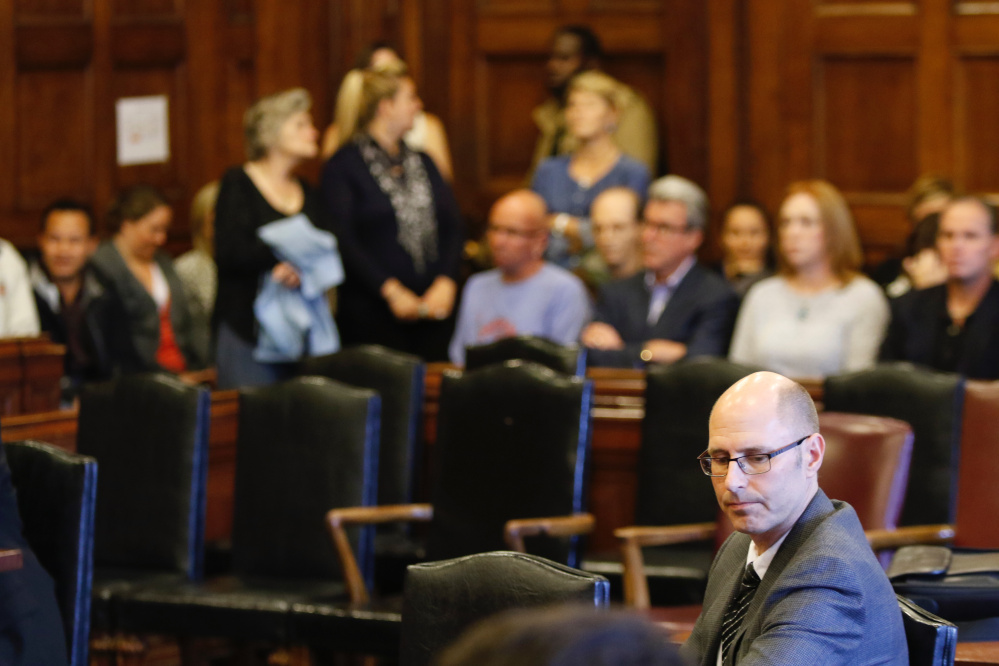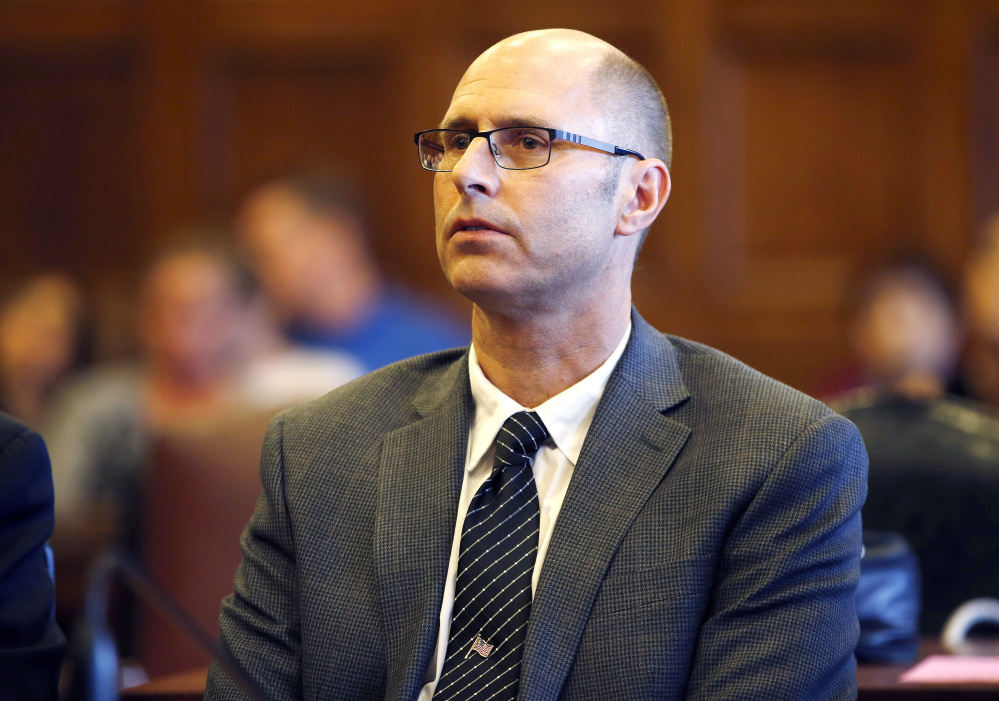Portland landlord Gregory Nisbet was acquitted Friday of the six manslaughter charges stemming from a deadly Noyes Street apartment fire two years ago.
Cumberland County Superior Court Justice Thomas Warren issued the verdict Friday afternoon in a packed courtroom that included relatives of some of the six people who died in the fire. Warren did find Nisbet guilty of a misdemeanor fire code violation for the lack of a secondary exit from the third-floor bedrooms.
Nisbet, 51, was charged with six counts of manslaughter – one for each of the young adults killed by the accidental 2014 fire in his Noyes Street building. No Maine landlord has ever been convicted of manslaughter for an accidental fire.
Warren said Nisbet was not entirely without blame for the deaths, including his failure to maintain the building and inspect the smoke detectors when new tenants moved in, but the state failed to prove beyond a reasonable doubt that any of the victims would have survived were it not for Nisbet’s actions. It was up to Warren to dispense the verdict because Nisbet waived his right to a jury trial.
Nisbet, who did not testify during the trial, showed no emotion as the verdict was read. He declined to comment as he left the courthouse.
Some family members left the courtroom before Warren finished reading his verdict, and family members and friends cried and consoled each other outside of the courtroom. One woman who was with the families called the verdict “ridiculous,” but did not want to be interviewed. Others declined to talk.
Reached by telephone several hours after the verdict, two relatives of people who died said they were upset with the judge’s decision.
“I feel there was no justice served,” said David Bragdon Sr., whose son David Bragdon Jr. died in his second-floor bedroom.
“We were very disappointed with the verdict,” said Lisa Mazziotti, the mother of Nicole “Nikki” Finlay. “He should have at least gotten the third-floor manslaughter (convictions). My daughter was on the third floor. We thought the prosecution had an ironclad case.”
Assistant Attorney General Bud Ellis, who helped prosecute the case, said it was clear that Warren gave the case a lot of thought, even though the judge didn’t agree that the state met the high burden of proof for manslaughter charges. “It was a somewhat unprecedented case that we felt needed to be brought forward,” he said.
Defense attorney Matthew Nichols was pleased with the verdict, but noted that the deadly fire still weighs heavily on Nisbet, who may address the court when he is sentenced for the code violation in the coming weeks.
“There’s a lot of sorrow. (Nisbet) was pretty close to all of the tenants,” Nichols said. “The young people – they were all good kids and nothing is going to alleviate the tragic nature of this and the pain and the sorrow that Greg Nisbet is feeling. That’s going to be with him for the rest of his life. I realize it’s more pain for the friends and family, especially the kids, but Greg has not been spared.”
The code violation is a Class E misdemeanor punishable by up to 180 days in jail and a $1,000 fine, Nichols said. A sentencing date is expected to be scheduled in the next several weeks.
A manslaughter conviction could have resulted in up to 30 years in prison.
Nisbet still faces a civil lawsuit filed against him by the families of the victims.
The Nov. 1, 2014, fire started in a plastic receptacle for cigarette butts on the front porch at 20 Noyes St., one side of a three-story duplex. It quickly spread through the house after Steven Summers, who was visiting a friend, opened the front door to escape, allowing air to fan the flames. He died of his burns days later.
The victims were tenants Bragdon Jr., 27, Finlay, 26, and Ashley Thomas, 29. Summers, 29, of Rockland, Maelisha Jackson, 23, of Topsham and Christopher Conlee, 25, of Portland were visiting the house for a Halloween party and also died.
It was Maine’s deadliest fire in 40 years.
In response to the fire, the city created a new Housing Safety Office, hired additional housing inspectors and began requiring landlords to register their units with the city and pay an annual fee. Some landlords and tenants also responded to the fire by focusing more on fire safety precautions, such as making sure smoke detectors are maintained.
The trial, which began on Oct. 3, attracted widespread attention. Family and friends of the six victims said they wanted to see Nisbet held accountable because his lax management and maintenance of the building contributed to the deaths. Many landlords said that Nisbet was not to blame – in part because tenants had disabled the smoke detectors – and that the charges set a bad precedent.
“This (fire) has been a grave reminder that everyone – landlords, tenants, and the City – has a role to play in ensuring that our neighbors have a safe place to live,” Portland Mayor Ethan Strimling said in a statement released after the verdict.
During the weeklong trial, the court heard testimony from survivors who described frantic efforts to escape as smoke and heat quickly spread and fire blocked the front entrance of the building. Two of the three survivors described their escape out a second-floor window because a rear stairwell was blocked by a former tenant’s belongings.
Rockland resident Paul Garrido testified that he heard two women screaming on the third floor, where two bedrooms and a bathroom were renovated without a permit. State prosecutors say Thomas, Finlay and Conlee could not get out because the third-floor bedrooms, which they described as “death traps,” lacked a secondary way to escape the building.
Warren noted that the fire had started on the front porch, where smoke detectors were not required, and consumed the front door. He also pointed to evidence that there can be a delay between the presence of smoke and the sounding of a smoke detector, as well as testimony from the state medical examiner that someone breathing carbon monoxide can be incapacitated in as little as 30 seconds.
All of these factors appeared to raise doubt about the state’s case.
“This was a fast-moving fire. There was almost no time to escape,” Warren said, before alluding to the intoxication of most of the victims, who had been partying on Halloween. “There was evidence that several of the occupants were in a condition from which they could not have easily been roused from either by a smoke detector or otherwise.”
State prosecutors mostly focused on the deaths that occurred on the third floor, where they argued two bedrooms and a bathroom were built without permits. While the city has confirmed there was no building permit, Warren said the state failed to provide proof during the trial that the unit was illegal and would have required a secondary escape. Nor did the state prove whether Nisbet himself, or a contractor, did the renovations, he said.
“And if permits were not obtained, the evidence does not reflect whether the defendant or a contractor was responsible,” he said.
Another key issue was whether 20 Noyes St. was being run as a rooming house, which would have required additional fire protection.
Here, Warren said the state also failed to prove its case.
Warren said that Nisbet is guilty of a misdemeanor code violation for the third-floor windows, since he had been warned by a building contractor that they were too small to qualify as a secondary means of escape.
Correction: This story was updated at 10:31 a.m. on November 2, 2016 to correct the age of Ashley Thomas.
Send questions/comments to the editors.







Comments are no longer available on this story